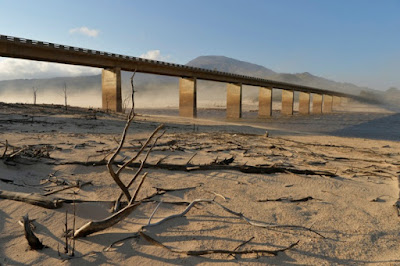Guest Post by Marisa Handler
I come from a city surrounded by water. Cape Town sits at the tip of Africa, where the Atlantic and Indian oceans meet. In precolonial times, the indigenous Khoena people called the Cape Peninsula “the place where clouds gather.” The winters of my childhood were memorable affairs, with frequent storms bringing gale force winds and drenching rains. But two years of severe drought have changed things, and now a different kind of storm is gathering.
Two and a half weeks ago officials announced the countdown to “Day Zero,” when the city will run out of water. That’s the day provincial dams are estimated to sink to a mere 13.5% of capacity. In the words of Cape Town mayor Patricia De Lille: “We have reached a point of no return.” Initially announced as April 21st, after farm irrigation was curtailed, Day Zero was moved up to mid-May. Unless the heavens unhinge or residents immediately begin abiding by strict rationing, Cape Town will become the first major city in the world to exhaust its water supply. Faucets will run dry, and Capetonians will have to collect their daily water ration from supply points. “The challenge exceeds anything a major city has had to face anywhere in the world since the Second World War or 9/11,” said Helen Zille, the Western Cape province premier.
Officials have begun announcing the 200 collection points throughout the city, at which the population of almost 4 million will be required to line up for their daily 25 liters (6.6 gallons). That’s around 20,000 people per supply point. Pundits are calling it a national disaster in the making, potentially crippling the “Mother City” of South Africa. Most schools will need to close. Jobs will be lost, property prices fall. Tourism, which accounts for 9% of the country’s annual revenue—Cape Town alone draws 2 million visitors each year—will certainly drop. Only hospitals and clinics will retain normal water supply. Despite the mayor’s explanation that “prior to filling their vessels, each person will be given a dose of hand sanitizer,” the inevitable sanitation issues mean serious potential for disease spread. While many affluent residents will likely leave the city, the millions living in the townships have no such recourse. At best, circumstances portend a logistical nightmare; at worst, chaos of dystopian proportions.
How did the situation get so dire?
In short, if you’ll excuse the pun, it’s the perfect storm: global warming meets incompetent leadership. The city is currently experiencing the worst drought in a century. By some calculations, a drought this severe should normally occur only once in a millennium. Researchers at the University of Cape Town estimate that low-rainfall years have become twice as frequent over the past century. According to the climate models, it’s only going to get drier.
Meanwhile, both city and provincial governments have been twiddling their thumbs.
Other than a tepid #ThinkWater public relations campaign, the warnings of water management experts have largely gone unheeded. Infighting within the Western Cape provincial government, currently run by the Democratic Alliance—the ANC’s main opposition on the national scene—has stalled effective action. When the city asked residents to limit water use to 87 liters (23 gallons) a day, only 39% complied. Residents are now being asked to limit themselves to 50 liters (13 gallons), but given the previous failure of voluntary appeals, this is clearly an inadequate measure. Until two weeks ago, officials had failed to follow through on pledges to fine excessive users. Given the long-term outlook—clear skies—the city has seven major water initiatives underway, but six of these are currently behind schedule. And four of them are desalination plants on the Atlantic Ocean, even though experts say that large-scale use of desalination will be too expensive for Cape Town to afford.
It’s a heady mix of denial and ineptitude. As Nic Spaull writes in South Africa’s online Daily Maverick, the crisis comes down to an outright failure of leadership. Of the 76 tweets in 2018 by the City of Cape Town, Spaull writes, less than a quarter have addressed water issues: “More than half are inane messages like “Top of the morning to you, Cape Town. With a high of 22, you can expect clouds and sunshine with a windy afternoon.” I don’t want the City to wish me a joyous morning and a jolly good night. I want them to make sure that I have water in my taps.” In a flourish of satirical proportions, the “Resilience Officer” of the Cape Province, who is charged with dealing with the drought, is currently on garden leave following an internal squabble over municipal bus procurements.
What is a thirsty city to do? Other than ration drastically, Capetonians can’t do much more than look to iconic Table Mountain and pray that its legendary waterfall of cloud—the “tablecloth”—will turn into rain. As for the rest of us, it’s a dire parable about the convergence of climate change, inept governance, and collective denial.
Marisa Handler is the author of the award-winning memoir Loyal to the Sky: Notes from an Activist. Her work has appeared in numerous publications, and she teaches Creative Writing at Mills College and Stanford. This piece was originally published in Tikkun
Thursday, February 8, 2018
Subscribe to:
Post Comments
(
Atom
)







0 comments :
Post a Comment